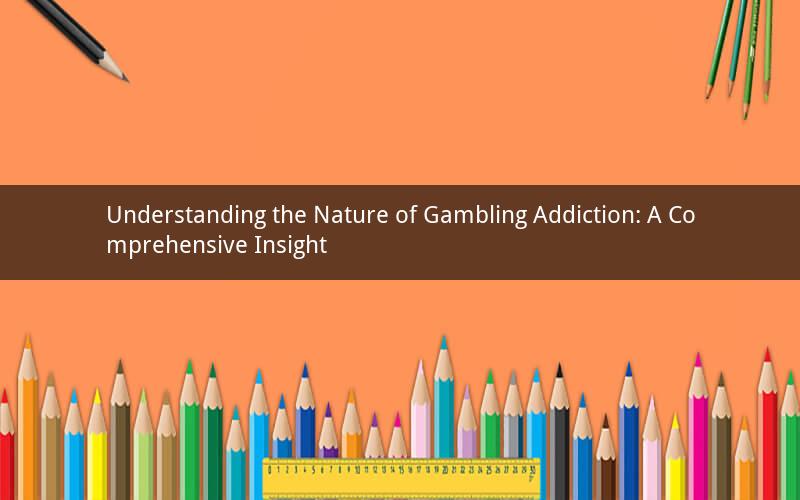
Gambling addiction, also known as problem gambling or compulsive gambling, is a condition where individuals exhibit an uncontrollable urge to gamble, despite the negative consequences it may have on their lives. This article delves into the nature of gambling addiction, its symptoms, causes, and potential treatment options.
Symptoms of Gambling Addiction
Gambling addiction can manifest in various ways, and its symptoms can vary from person to person. Some common signs of gambling addiction include:
1. Inability to control gambling behavior: Individuals with gambling addiction often find it difficult to control their urge to gamble, even when they know it's causing harm to their personal, financial, or professional life.
2. Preoccupation with gambling: A person suffering from gambling addiction may spend a significant amount of time thinking about gambling, planning their next gambling session, or reliving past gambling experiences.
3. Repeated unsuccessful attempts to stop gambling: Those with gambling addiction may repeatedly attempt to stop gambling, but they often find it challenging to do so.
4. Lying to hide gambling behavior: Individuals with gambling addiction may lie to family members, friends, or therapists about their gambling habits to conceal the extent of their problem.
5. Risking or losing important relationships, jobs, or education: Compulsive gamblers may prioritize gambling over their personal relationships, work, or education, leading to the deterioration of these aspects of their lives.
6. Using gambling as a way to cope with stress or negative emotions: Some individuals with gambling addiction may turn to gambling as a means of coping with stress, anxiety, or depression.
Causes of Gambling Addiction
The exact cause of gambling addiction is unknown, but several factors may contribute to its development. These include:
1. Genetic predisposition: Research suggests that genetics may play a role in the development of gambling addiction, as individuals with a family history of addiction may be more susceptible to developing a gambling problem.
2. Environmental factors: Exposure to gambling opportunities, such as casinos, online gambling sites, or gambling advertisements, may increase the risk of developing a gambling addiction.
3. Psychological factors: Individuals with certain personality traits, such as impulsivity, thrill-seeking behavior, and a low tolerance for frustration, may be more prone to developing a gambling addiction.
4. Mental health issues: Some individuals with gambling addiction may also suffer from other mental health disorders, such as depression, anxiety, or substance abuse.
Treatment Options for Gambling Addiction
Treating gambling addiction involves a multifaceted approach that addresses the underlying causes and symptoms. Some common treatment options include:
1. Cognitive-behavioral therapy (CBT): CBT is a type of psychotherapy that helps individuals recognize and change negative thought patterns and behaviors associated with gambling addiction.
2. Family therapy: Family therapy can help improve communication and relationships between individuals with gambling addiction and their loved ones, fostering a supportive environment for recovery.
3. Support groups: Joining a support group, such as Gamblers Anonymous, can provide individuals with gambling addiction with a sense of community and shared experiences, making it easier to cope with their addiction.
4. Medication: In some cases, medication may be prescribed to help manage symptoms of co-occurring mental health disorders, such as depression or anxiety.
5. Self-help strategies: Individuals with gambling addiction can develop self-help strategies, such as setting a budget for gambling, avoiding triggers, and seeking help from friends and family when needed.
Frequently Asked Questions
1. Q: Can gambling addiction be cured?
A: While there is no guaranteed cure for gambling addiction, effective treatment can help individuals manage their addiction and reduce the risk of relapse.
2. Q: Is there a difference between gambling addiction and problem gambling?
A: Yes, problem gambling is a less severe form of gambling addiction. It involves some of the same symptoms but may not have as severe consequences on an individual's life.
3. Q: Can gambling addiction be inherited?
A: While genetics may play a role in the development of gambling addiction, it is not considered a purely genetic disorder.
4. Q: Can treatment for gambling addiction help with other mental health issues?
A: Yes, treatment for gambling addiction can help address co-occurring mental health disorders, such as depression or anxiety.
5. Q: Is it possible to prevent gambling addiction?
A: While there is no foolproof way to prevent gambling addiction, individuals can reduce their risk by avoiding exposure to gambling opportunities, setting a budget for gambling, and seeking help if they suspect they may have a problem.